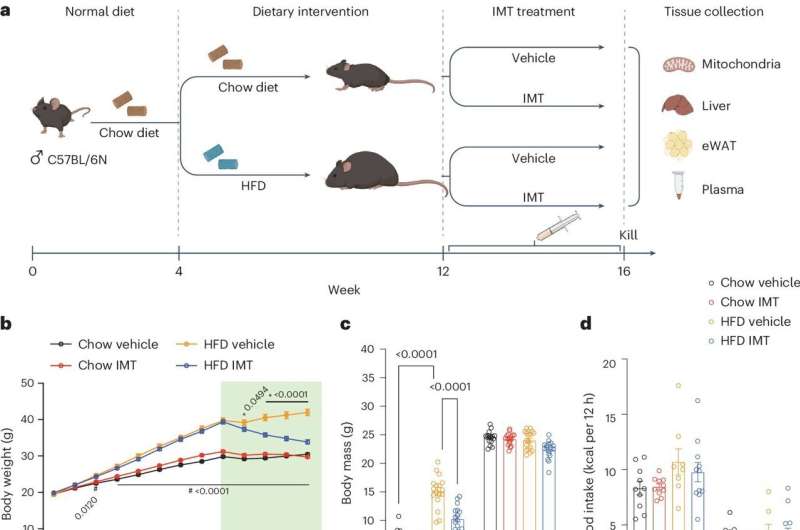This article has been reviewed according to Science X's editorial process and policies. Editors have highlighted the following attributes while ensuring the content's credibility:
fact-checked
peer-reviewed publication
trusted source
proofread
New drug candidate reverses obesity in mice

Researchers at Karolinska Institutet may have found a new way to treat obesity and related disorders by targeting the cells' mitochondria. A study published in Nature Metabolism shows that a specific class of drugs that block mitochondrial function can reverse diet-induced obesity, fatty liver and diabetes in mice.
Mitochondria are essential for human health, as they process the nutrients in the food we eat and harvest the energy needed for various processes in the cell. They are central regulators of metabolism, which is very dynamic and can be rerouted and reprogrammed according to different needs or in response to disease.
Increased fat metabolism
Professor Nils-Göran Larsson's research group at Karolinska Institutet in Sweden has recently developed highly specific drug candidates that block mitochondrial function, and thus cellular energy production, to treat cancer. Now the researchers have shown that these drugs also have a beneficial effect on metabolism in mice.
"Four weeks of treatment led to an unexpected increase in fat metabolism, resulting in a drastic weight loss, a reduction in fat accumulation in the liver and restored glucose tolerance," says postdoctoral researcher Taolin Yuan at the Department of Medical Biochemistry and Biophysics, Karolinska Institutet.
The treatment was given orally to male obese mice who had been fed a high-fat diet. The surprising effect suggests that blocking the cells' energy production can reverse obesity and diabetes.
Collaboration with a biotech company
"It's exciting that we have identified a new potential strategy for treating common diseases like obesity and type 2 diabetes," says Professor Nils-Göran Larsson.
"We now aim to further investigate the mechanisms that can explain the drugs' effect. We have also initiated a collaboration with a biotech company to see if this can be further developed into a treatment for humans. Still, it will be many years before we know if it works," he concludes.
More information: Jiang, S., et al, Inhibition of mammalian mtDNA transcription acts paradoxically to reverse diet-induced hepatosteatosis and obesity, Nature Metabolism (2024) DOI: 10.1038/s42255-024-01038-3





















